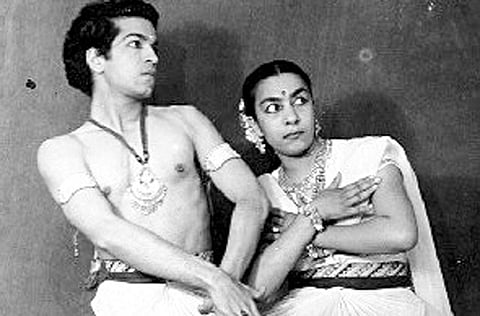I have done everything in life: Zohra Segal
Zohra Segal, stage and screen icon, celebrates her 100th birthday with an official biography

Abhi na jaana chhod kar... ki cake abhi kata nahin... ki pet abhi bhara nahin [Don't leave the party, the cake hasn't been cut yet, tummy isn't filled yet]," recited the blue-eyed "baby" of entertainment, Zohra Segal, on her 100th birthday, punning on her favourite sonnet, Abhi To Main Jawan Hoon by poet Hafeez Jullundhri as she cut a large chocolate cake.
Her characteristic lust for life appeared undimmed late on Friday at the launch of her first official biography, Zohra Sehgal: Fatty by daughter Kiran Segal. And "Segal" is how they have preferred to spell the name.
The title "Fatty" is an endearment used by Kiran for her "weight conscious mother", who "is very particular about her figure, like a 16-year-old starlet".
"She weighs herself every week and if she is a little bit [overweight], then at lunch it is one [slice of] toast instead of two," Kiran said.
Born on April 27, 1912, in Saharanpur to Rohilla Pathan landlords, Segal went with her uncle to England by road from India "in an old Dodge car through Afghanistan and Iran" to train as an actor.
She recalls the journey in detail: "I sat in the front with my uncle. A young man sat at the back." She caught a boat to Europe from Egypt.
The biography, a pictorial monogram, was unveiled by Prime Minister Manmohan Singh's wife Gursharan Kaur.
The actress was presented with a bouquet of 101 roses, a cake, a commemorative photograph by the Safdar Hashmi Memorial Trust (SAHMAT), a painting by the director-general of the Indian Council for Cultural Relations and gifts by family and old friends.
Segal was surrounded by representatives of four families — her daughter's, son's, her own family and those of her in-laws that she said "went into the making of the Segal story".
"Ao ao, yeh mauka aur nahin milega [come, come you will not get this opportunity again]," she said as she commanded them onto a small podium.
Segal revealed the secret to her long life was "an inner fire that has pushed me through life".
"I have often told my daughter that I felt I have done everything in life and I wish someone would euthanise me. I will sleep in peace with an injection," she said.
Releasing the book, Kaur, who addresses the actress as "ammi" (mother), said it was a proud day as "dear Zohraji completed 100 years of her extremely productive life".
"Zohra is a multi-faceted icon of youthful zeal. She is a mysterious woman, though [her] life was an open book. It is an emotional moment for us."
The low-key celebration was one marked with nostalgia and reminiscence. A documentary by noted stage personalities M.K. and Anant Raina, Zohra Segal: An Interview 2012, structured around a lengthy conversation with the actress and footage of her early years from family albums walked the guests through 75 years of her active life.
It began with Zohra as a teenager, her years abroad, as a dancer in Uday Shankar's troupe, her days at the Prithvi Theatre, her marriage to Kameshwar Segal, her family and movies.
Segal describes husband Kameshwar, her young student, as "a versatile talent who was a jack of all trades but who could master none".
"He was a talented artist, homoeopath, dancer and a cook... but he could not be famous," she said.
"Zohra's stamina is like an ocean," friend and interviewer M.K. Raina recalled.
Raina met Segal at the Mandi House in New Delhi for the first time when she was assigned to manage the National Folk Ensemble by the late prime minister Indira Gandhi.
‘It was spontaneous'
Later, Segal became a stout advocate of the progressive campaigns by the SAHMAT to promote social causes and the friendship between Raina and Segal deepened.
Recounting the making of the pictorial biography, Kiran said: "When I was first approached by the publishers, I did not want to write the book because I was neither a writer nor historian. What can I say about my mother? But after much insistence, I started jotting down what I could remember from my childhood. When she was free, we would talk. I did not want the book to be edited because it was spontaneous."
Long-time associate Dolly Thakore, actress, casting director and television personality, said she had met Segal in 1966 in London to rehearse for a play at Segal's house.
"Apa [Segal] was working at the India Tea Board. At the time, there was an epidemic in London and being Indians, we were herded like labourers. We decided we had enough of the discrimination and formed the Coloured Artists' Dramatic Association," Thakore reminisced.
Segal, on her part, has not given up on life. "I want to be blonde with blue eyes," she said.


